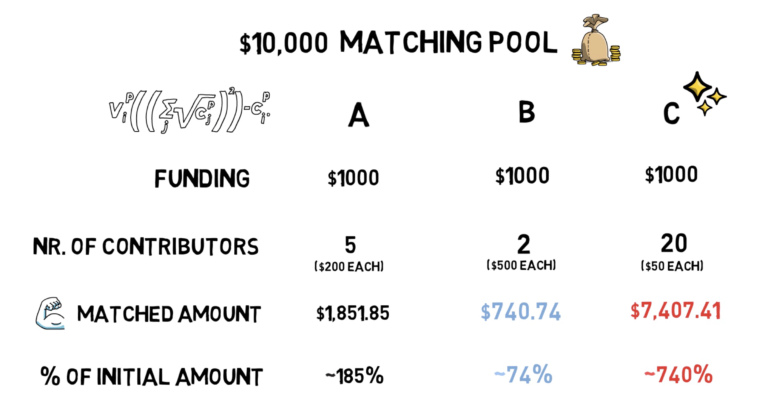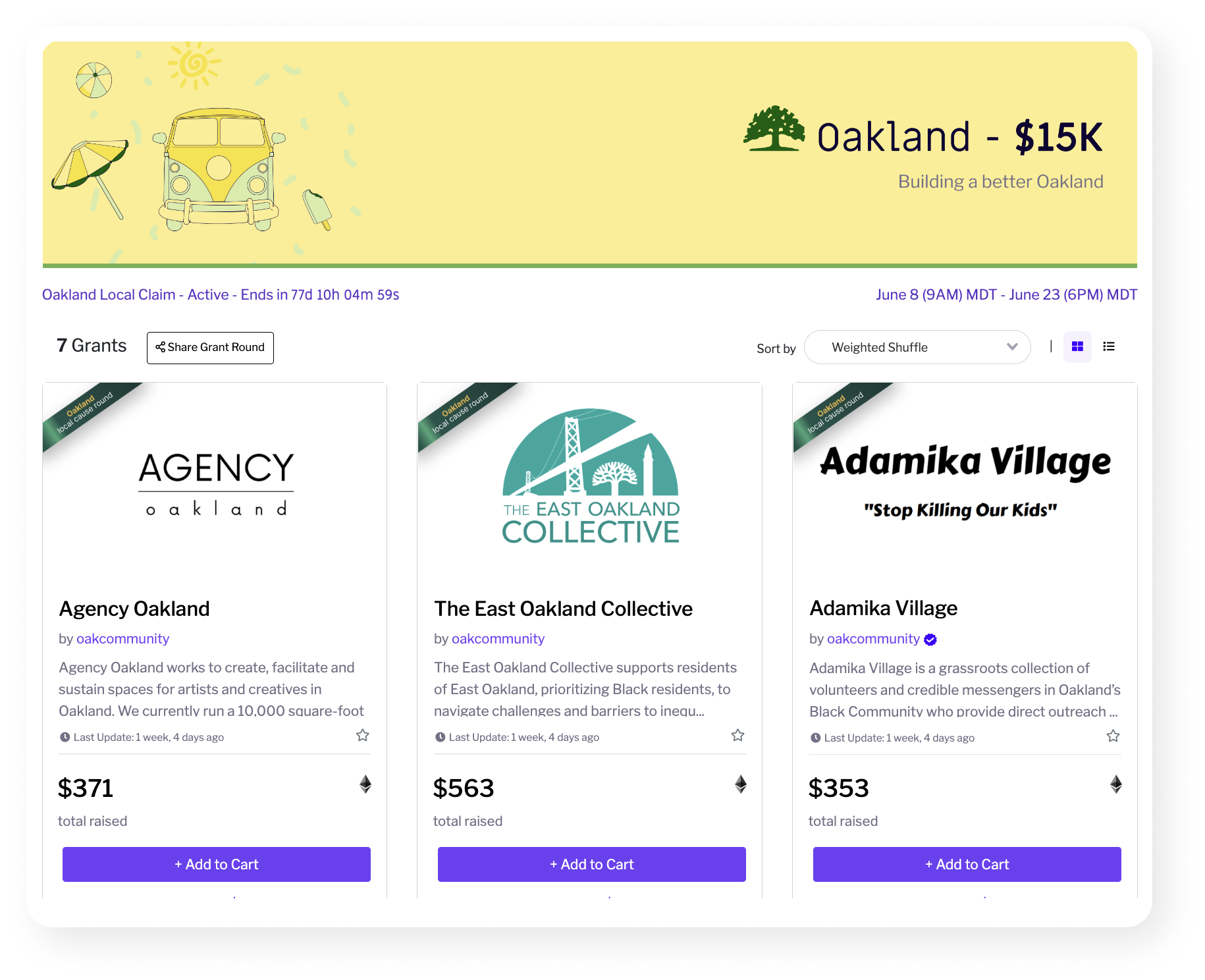TL;DR: city3 and Gitcoin’s first local quadratic funding experiment saw 7 Oakland nonprofits raise ~$4,000 from 240+ unique contributors. In this recap we share the opportunities and challenges in bringing innovative governance models to offline communities.
city3’s mission is to create more just socio-economic systems powered by crypto for existing real world communities. As part of this effort, we recently partnered with Gitcoin to bring quadratic funding to the city of Oakland.
Quadratic funding (QF) is a democratically scalable way of funding public goods, where matching capital is distributed based on a quadratic formula that makes the number of contributors matter more than the amount raised.

We originally set out with three broad questions outlined in our announcement:
- Is supporting an organization that you care about an effective incentive for someone to set up a web3 wallet?
- What can quadratic funding tell us about the way people value civic organizations?
- Will small dollar contributors feel they’ve made a significant contribution?
In this article we highlight two major takeaways from the experience:
- To optimize positive results, we should identify the types of decisions and/or public goods that thrive when QF is applied. We recommend a stronger alignment with the two problems QF is designed to address: information asymmetry and the free rider problem.
- Governance experiments need to prioritize building trust, accessibility and diverse representation. Funding real-world public goods comes with its own set of challenges, but existing tools are not designed for offline communities. This is an open call for more QF projects “in the wild”.
Overview and results
During Gitcoin Grants Round 14 which ran from 8-23 June 2022, 7 Oakland nonprofits raised $3,799.07 from 454 contributions and 249 unique contributors. $15,000 has been set aside for matching, funded jointly by city3 and the Oakland Fund for Public Innovation.

Although contributing to the round was open to anyone, we hosted a series of virtual governance workshops aimed at assisting locals with setting up a non-custodial crypto wallet and Github account, and then navigating Gitcoin’s checkout process.
During these workshops we saw firsthand how most web3 tools are simply not designed for offline communities, let alone mobile-first users.
Yet despite the friction, several residents expressed surprise that crypto could be used in this way. For those interacting with crypto for the first time, there was something viscerally meaningful about seeing a $5 donation get matched with $30 for an organization in their community. Those already familiar with crypto expressed a desire to see more of these initiatives:
“I am currently working full time for a DAO, and it's cool how global it is, but would love to get more involved [with] local web3/crypto efforts.”
Exact numbers on local participation are not available, but by combining Gitcoin’s profile location data with the number of people who attended our governance workshops and/or responded to our feedback surveys, we estimate that 20% of contributors were Oakland residents.
Clearly, there exists some critical threshold at which representation either justifies or undermines the entire quadratic funding process. This also highlights why education and accessibility are so important, and ought to be considered integral to any effective quadratic funding program.
Consider a hypothetical grants round with higher-stakes decisions. While outside funding might still be useful to maximize funds raised, would we still weigh votes equally between locals and non-locals? We’re excited about the early although untested solutions that attempt to solve this, such as intersectional social data (see RadicalxChange) or geo-spatial weighting (see Astral Protocol or Foam).
Where does quadratic funding matter most?
In their 2020 paper, Building Radical Cities, Paul Healy and Matt Prewitt identify QF as one of several mechanisms to better calibrate political expression at the city level. QF has been a popular choice for distributing public grants in the cryptosphere. For example, Gitcoin Grants Round 14 saw record breaking numbers: over 44,000 contributors donated $1.7M which will be boosted by a $3.2M matching pool.
Just as QF supports “long tail” crypto projects – novel, small initiatives that otherwise would not be able to accumulate startup capital – we set out to test whether the same could be applied to long tail “real-world” projects, particularly civic organizations that play a critical role in serving their communities. While several offline projects have raised funds with Gitcoin in the past, this was the first time matching was targeted at a specific geographic community.
We are incredibly proud to have worked with Oakland nonprofits doing important work ranging from tech mentorship to supporting gang-impacted youth. And while we believe that nothing bad happens when impactful community organizations get money they deserve, in hindsight we do question whether funding local nonprofits was the most useful application of this governance tool.
The benefit of QF lies not so much in matching large sums of capital to small donations as in surfacing the nuance of community preferences in order to produce the best possible allocation outcome for decisions involving competing public goods.
Here we turn to the two problems QF is most cited to solve:
- QF solves an information problem. In a world of scarce resources, the government (or more broadly, the public) does not always know how much of a certain good to provide
- QF solves a free rider problem. Those who benefit from public goods often underpay or don’t pay at all because there is little incentive to make small, individual contributions.
We believe we could have done a better job of scoping the problem space and designing our QF program to directly address these areas. For our next experiment, we may consider these questions as part of our decision making framework:
- What are some examples of competing public goods that we find difficult to prioritize in the local city budget?
- What are some areas of public resource allocation that people frequently complain feels unrepresentative and/or unfair?
- What are some alternative governance models already being applied in the community (e.g. participatory budgeting, neighborhood council advisory boards) – are they willing to try a new approach?
A call for more quadratic funding “in the wild”
Some of our biggest coordination challenges exist at the city level. While there is growing interest in new governance models enabled by web3 technology, we haven’t seen these implemented outside of a few examples. In other words, whether quadratic funding is indeed democratically and economically optimal is yet to be tested at scale.
This presents a massive opportunity to combine the best of tokenized governance with decisions that tangibly affect the communities we live in. Several organizations are already doing work that makes this possible:
We hope to see more crypto tools designed to serve real-world communities. For this to happen, we simultaneously need to invest in pre-existing social infrastructure that has a long legacy of making our cities more just, more livable and more resilient.
Conclusion
QF is only as impactful as it is accessible and only as useful as it solves critical problems that could not be solved through simpler means.
The Oakland local cause round was the first of many programs city3 will be launching to bridge web3 innovation with the needs of real-world communities. Just as crypto crowdfunding has expanded possibilities for seeding public goods, we have a unique opportunity to shift resource allocation within our cities.
Follow us on Twitter to stay up to date with our work.
Thanks to [Lane Rettig](https://Lane Rettig), Ale Borda and Jeff Emmett for reviewing this post.